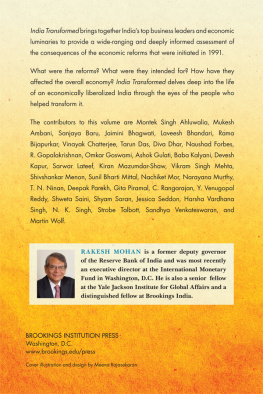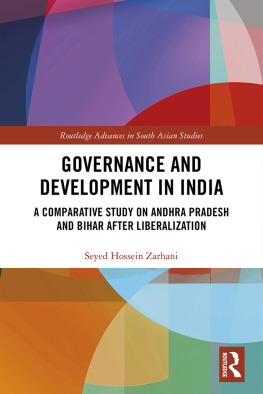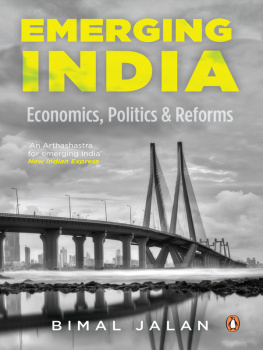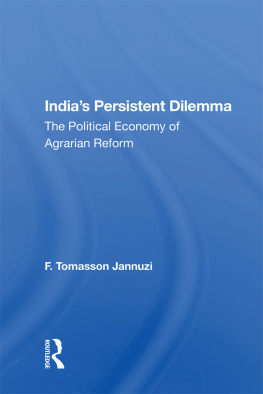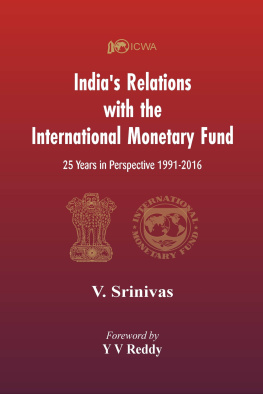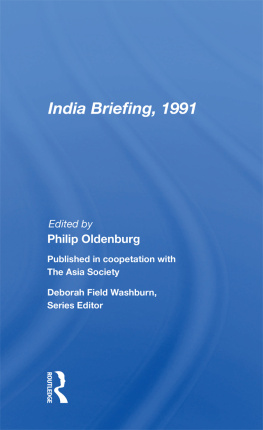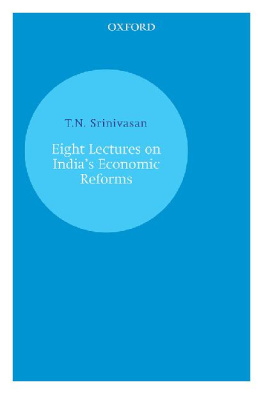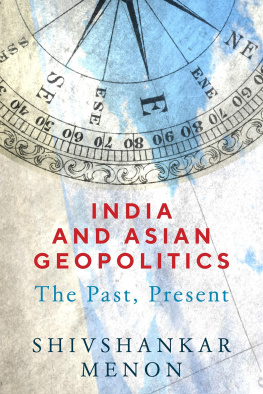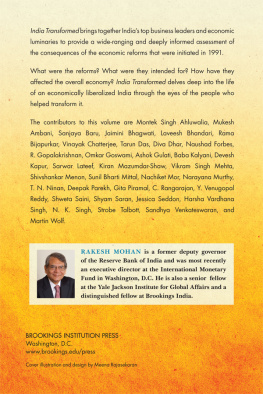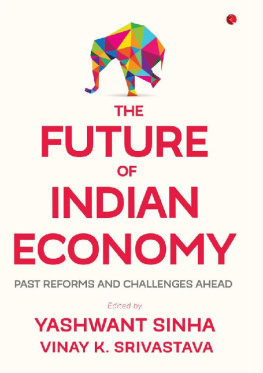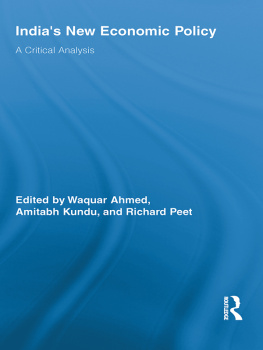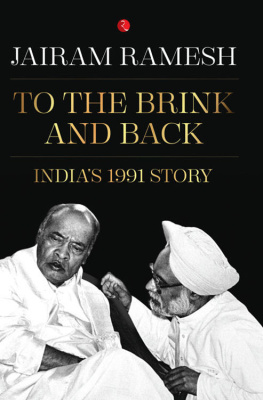INDIA
TRANSFORMED
25 Years of Economic Reforms
edited by
RAKESH MOHAN
Brookings Institution Press
Washington, D.C.
Copyright 2018
Brookings Institution India Center
THE BROOKINGS INSTITUTION
1775 Massachusetts Avenue, N.W., Washington, D.C. 20036
www.brookings.edu
All rights reserved. No part of this publication may be reproduced or transmitted in any form or by any means without permission in writing from the Brookings Institution Press.
The Brookings Institution is a private nonprofit organization devoted to research, education, and publication on important issues of domestic and foreign policy. Its principal purpose is to bring the highest quality independent research and analysis to bear on current and emerging policy problems. Interpretations or conclusions in Brookings publications should be understood to be solely those of the authors.
Library of Congress Cataloging-in-Publication data are available.
ISBN 978-0-8157-3661-5 (paper)
ISBN 978-0-8157-3662-2 (ebook)
987654321
Contents
Rakesh Mohan
Montek Singh Ahluwalia
Omkar Goswami
T.N. Ninan
Martin Wolf
Harsha Vardhana Singh
Shivshankar Menon
Shyam Saran
Sanjaya Baru
Sarwar Lateef
Tarun Das
Y. Venugopal Reddy
Laveesh Bhandari
Ashok Gulati, Shweta Saini
Baba Kalyani
Vikram Singh Mehta
Jessica Seddon, N.K. Singh
Vinayak Chatterjee
Devesh Kapur
Nachiket Mor, Diva Dhar, Sandhya Venkateswaran
C. Rangarajan
Jaimini Bhagwati
Deepak Parekh
Omkar Goswami
Gita Piramal
Naushad Forbes
Rama Bijapurkar
Mukesh D. Ambani
Sunil Bharti Mittal
R. Gopalakrishnan
Kiran Mazumdar-Shaw
Narayana Murthy
Preface
T his book should have been published in 2016 when the country completed twenty-five years of economic reforms. That was our intention, but it was clearly too ambitious to expect success in producing such a book within eight months of the inception of the idea. But, better late than never.
I have been fortunate to have had the opportunity to serve the Government of India in a host of different capacities throughout the reform period from 1991 until late 2015. For a professional economist, nothing can be more exciting and gratifying than being part of a policy process that sets a country on a sustainable growth path that lasts over a long period. India has already grown at an average annual rate of around 6.5 per cent for almost thirty-five years. This was a significant acceleration over the anaemic rate of 33.5 per cent over the previous thirty-five years. We can hope that such a process will continue and even accelerate to the next stage at near 10 per cent over the next quarter century and beyond. As documented by the World Banks growth commission, since 1950, only thirteen countries have exhibited annual growth rates of 7 per cent or more for a period of twenty-five years or longer. India hasnt quite joined this exclusive group but it must be our collective endeavour to do so in the coming years. That is the challenge facing the next generation of economic strategy, reform processes and performance.
This is therefore a good time to chronicle the kind of change that the country has experienced over this past quarter century. In some areas the change has been truly transformative, while in others, much more could have been done, particularly in the areas of health, education and agriculture. What reforms were carried out and how do they affect the country? What were our expectations in 1991? What has been achieved, and what not? And, where do we go from here? These are the kind of questions that we set out to address as we started work on this book.
Through my thirty years being in and around the government, I have had the good fortune of being associated in different ways with each of the remarkable individuals who have contributed to this book. I have called upon our bonds of friendship to persuade each of these busy individuals to reflect on their experience as they have transformed themselves, their respective organizations and their country over these twenty-five years. This book brings together thirty technocratic leaders who have participated in this exciting project of nation-building since the early 1990s. This group includes some of the key policymakers and advisers, academics, industry leaders, opinion makers and commentators. Each of them has made key contributions over this period to bring India where it is today. They have worked in their respective fields consistently, and retained their credibility and commitment across a succession of diverse governments of different political persuasions. They have displayed professionalism of the highest order in their respective areas of operations.
My greatest debt of gratitude goes to each of these impressive individuals who, in their folly, agreed to engage and commit their time to contributing to this collection. Given the many different pursuits that they are engaged in, it has been an act of considerable generosity to submit to the tortuous process that goes into the publication of any book. Each of them submitted to the various revisions that I subjected them to, somewhat cheerfully, and then to the professional editing process that followed.
Hence, my heartfelt appreciation for this act of friendship expressed by each of the contributors.
Vikram Mehta, in his role as chairman of Brookings India, must shoulder the blame for setting me on this task. As I returned to India in late 2015, after serving as executive director of the International Monetary Fund (IMF), he asked me to babysit Brookings India in early 2016 as he hunted for a full-time successor to Subir Gokarn who had led Brookings India from its inception in 2013, and who had to leave to succeed me at the IMF. As I took up my position in Brookings India, he thought I should also do something more substantive. He came up with the idea that Brookings India should do something to commemorate twenty-five years of reforms. Foolishly, I agreed readily. Then ensued a number of discussions of what this task would entail; and the idea of this collection emerged. My sincere thanks to Vikram for setting me up for doing this and then providing unstinting support, both personally and institutionally. This included active prodding of some recalcitrant authors.
I have received consistent support from Nitika Mehta, the head of development and communications, and Shruti Gakhar, the development and communications officer at Brookings India, throughout the fifteen months or so that this project has taken. Nitika was instrumental in convincing Penguin Random House to publish this volume; how she did so remains a mystery to me since it agreed to do so even before there was any content available. Shruti has been diligently keeping track of each draft article at every stage and has kept all communications with both authors and the editors in good order. Together, they have been the chief interlocutors with the publishers and authors. Along with the publishers, they are also responsible for managing the communications strategy for promotion of the book. My sincere thanks for their consistent and devoted diligence to these tasks which have been far beyond their normal calls of duty at Brookings.
My academic home is now at the Jackson Institute for Global Affairs at Yale University. Most of the work on this volume was done over the 201617 academic year at Yale. My sincere thanks go to Jim Levinsohn, the director of the Jackson Institute, for inviting me back to teach at Yale. The quiet, salubrious and supportive environment at the institute was very helpful in getting this task done. As it happens, the finishing touches to my last book were also done at the Jackson Institute in Yale in 2010.
Next page
